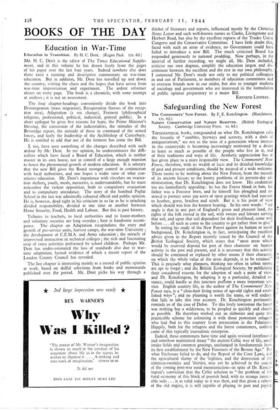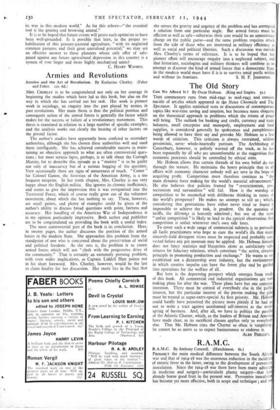Safeguarding the New Forest
Nature Conservation and Nature Reserves. (British Ecological Society. Cambridge University Press. Is. 6d.)
TOPOGRAPHICAL baoks, compounded on what Dr. Kenchington calls the formula of "rambles, byeways and scenery, with a dash of antiquarianism," are not to the taste of a generation whose interest in the countryside is becoming increasingly motivated by a desire to learn as much as possible of the people who live in it, and of their traditions and ways of life. Aesthetic appreciation has at last given place to a more responsible view. The Commoners' New Forest, therefore, with its wealth of facts and its detailed knowledge of past and present conditions should be assured of a wide welcome. There seems to be nothing about the New Forest, from the records of its ancient history to the knotty problems of its present-day ad- ministration, that Dr. Kenchington does not know. His credentials too are immediately appealing : he has the Forest blood in him, his father was a Forester born, and he himself has ploughed and re- stored to pasture some 500 acres of open grazings which had run-out to heather, gorse, bracken and scrub. But it is his point of view which should win him the keenest hearing. In his own words : "my angle is that in any part of England's green and pleasant land, the rights of the folk rooted in the soil, with sweats and labours serving that soil, and upon that soil dependent for their livelihood, come well before ... all such as come to the country to get rather than to give."
In setting his study of the New Forest against its human or social background, Dr. Kenchington is, in fact, anticipating the excellent advice given in the Report recently issued by the Council of the pritish Ecological Society, which states that "most areas which would be reserved depend for part of their character on human activity in the past and present, and it is necessary that this activity should be continued or replaced by other means if their character, on which the whole value of the areas depends is to be retained." This is precisely what planners, thinking too often in urban terms, are apt to forget ; and the British Ecological Society, by publicising their considered reasons for the adoption of such a point of view, and Dr. Kenchington, by adapting it to a particular, detailed in- stance, could hardly, at this juncture perform a more important ser- vice. English country life, as the author of The Commoners' New Forest says, is a "close-knit living nexus of age-old rights and estab- lished ways "-' and no planning is worth the name, or will endure, that fails to take this into account. Dr. Kenchington pertinently reminds us of the case of Defoe. To this lively townsman the forest was nothing but a wilderness, to be peopled as quickly and closely as possible. He therefore worked out an elaborate and quite im- practicable scheme for colonising it with those protestant refugees who had fled to this country from persecution in the Palatinate. Happily, both for the refugees and the forest commoners, nothing came of this typically journalistic enterprise.
Indeed, these commoners have time and again resisted interference and somehow maintained intact "the ancient Celtic way of life, small intake fields and common grazings, unchanged in fundamentals from its first establishment by the New Foresters of the Bronze Age." But what Enclosure failed to do, and the Repeal of the Corn Laws, and the agricultural slump of the 'eighties, and the depression of the nineteen-twenties and 'thirties, may yet be achieved in the courie of the coming post-war rural reconstruction—in spite of Dr. Kenci)- ington's conviction' that the Celtic solution to "the problem of the rural economy of this block of poorish land, with its strange intract- able soils ... is as valid today as it was then, and that given a rebore of the old engine, it is still capable of playing its part and paying
its way in this modern world." As for this rebore—" the essential tool is the grazing and browsing animal."
It is to be hoped that future events will prove such optimism to have been well-grounded. Is it possible that here, in the proper re- habilitation of this peasant-pastoral agriculture, "with its neglected common pastures and their great unrealised potential," we may see an effective answer to those planners whose only offer of safe- guard against any future agricultural depression in this country is a system of ever larger and more highly mechanised units?
C. HENRY WARREN.



























 Previous page
Previous page